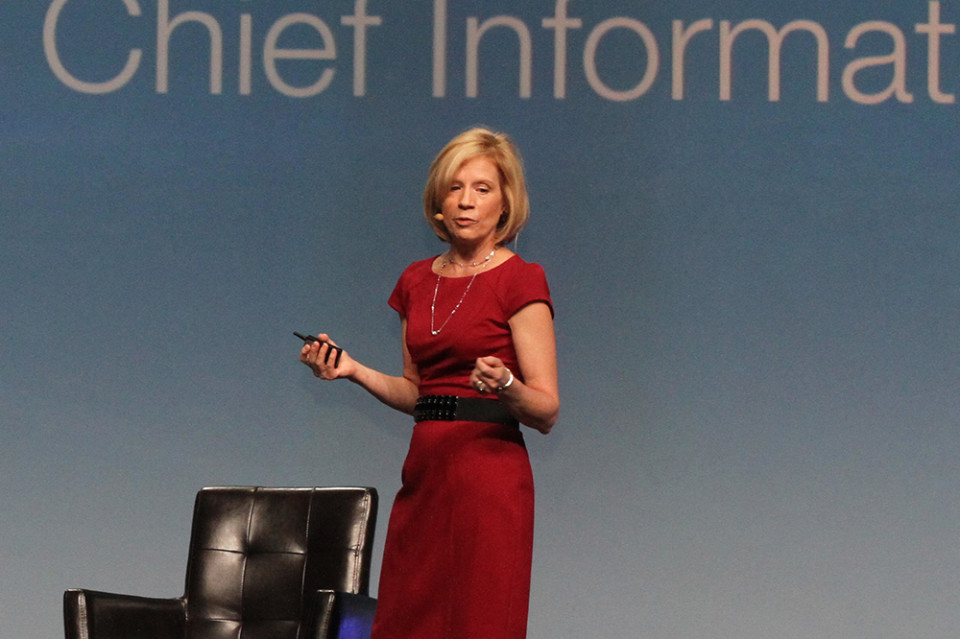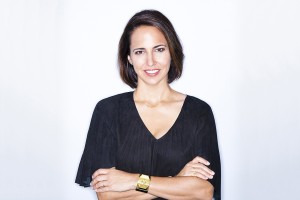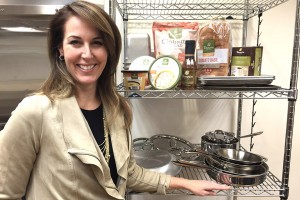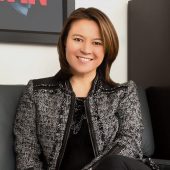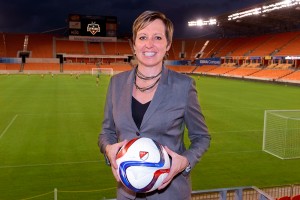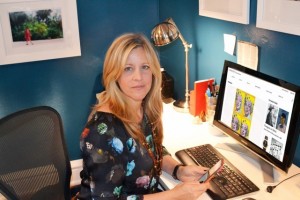Cynthia Stoddard, CIO at NetApp, STEM Specialist, and Gardening Devotee
We hear a lot these days about the topic of STEM, especially for girls. Well, Cynthia Stoddard could be a role model for all those young women out there who are now encouraged to go into the STEM field – but she did it, as she notes, “when it was uncool; it was downright dorky.” She has certainly bypassed that socially created (and now thankfully archaic) attitude, and is currently an SVP and Chief Information Officer at NetApp, a Sunnyvale, CA-based “data management and cloud storage solution” company.
She grew up in Massachusetts with both supportive parents and a very encouraging high school teacher, who urged her to try for college scholarships; Stoddard went on to not only win one, she graduated cum laude with a degree in accounting. She then started out working on pensions at Travelers Insurance, but soon used her considerable math skills to transition into the IT field. In her current role at NetApp, she is a practitioner of an open-door policy with employees, letting “people speak whatever is on their minds,” and a great believer in mentoring.
Feeling that math has brought her great joy, she has used it in her personal life to show one of her daughters that “she can be a cool mom,” by (interestingly!) using her geometry skills to create the perfect bridesmaid dress. She also loves gardening, has a “very supportive” spouse, and is yet another adherent of the twenty-first century power-breakfast item, yogurt. For anyone who wants to read about a STEM-focused female who truly lives and breathes the concept – with a happy personal life as well – see below for more.
Can you tell the readers a little bit about yourself?
I have a broad range of global technology and IT experience across a variety of industries, including insurance, transportation, logistics, retail, and high tech. In fact, I’ve done just about every job in IT. Along the way I’ve also built a family, which includes my four wonderful children and a very supportive husband.
Throughout my career, my priority has been to focus on business value and customer success. Over the years, I have made it my job to understand customer aspirations, needs, and challenges. Combining this knowledge with my ability to nurture strong relationships and help people unleash their hidden talent is a key ingredient to my success in IT. It’s also a key to my success at NetApp, which has a culture that places people—employees, customers, and partners—first.
What does a day in your shoes typically look like?
My day is divided in threes. One third of my day is focused on external business, working with customers and partners. Another third is focused on growing my team and empowering them to do great things. The final third is focused on the business.
What are the first three things you do when you wake up in the morning and the last three things you do before you go to bed?
The first thing I do in the morning is check e-mail on my iPad to ensure that everything is okay and to mentally prep for the day. Second, I take my dog for a walk and then come back and have breakfast.
In the evening, I check e-mail one last time. I make sure that my dog is okay and then last I say goodnight and I love you to my family. That’s the most important thing, to conclude the day by speaking with my family.
What is your breakfast of choice?
I’m a big fan of vanilla or peach yogurt with granola.
What keeps you energized and motivated at work?
In all my roles, I’ve found that people—and understanding their thought process, what excites them, and recognizing them—can be a great motivator. A motivated staff and great partners have an impact on the business and provide the ultimate success.
What is your favorite part about your job?
It’s the people. I love watching people grow their careers, and I love mentoring individuals. In addition, I find happiness in engaging and working closely with teams, peers, customers, partners, and influencers. It’s this type of collaboration that helps all of us and the businesses accomplish great things.
What and who inspires your work?
In high school I had a math teacher who was truly inspiring. She encouraged me to enter science fairs—which I won! She also encouraged me to apply to colleges and for scholarships.
My high school math teacher was the one who helped me see math as a valuable and powerful tool that I still use throughout my personal and professional life. I love math! I’ve loved it since before it was cool, when being a girl and liking math was not just uncool, it was downright dorky.
How does your culture/background influence your work?
As a young child, one of my jobs was to act as my grandmother’s translator—she didn’t speak English. I helped her with shopping, and I took this responsibility very seriously. I used my math to ensure that she was getting the right change. When I was in high school, I used my math skills to design mouse mazes for science-fair competitions. As I mentioned, my high school math teacher was very supportive and urged me to enter these competitions. My dad worked closely with me to create mind-bending algorithms to calculate how different shapes slowed a mouse down. It was complex and some may even say nerdy, but it was cool to me. And I won the prize—a day at a nuclear power plant.
As a mother, when my youngest daughter wanted a junior bridesmaid dress exactly like the bridesmaids’ dresses, I used my geometry skills to create a pattern. I was very proud. The dress was gorgeous and my daughter loved it. I used my math skills to show my daughter that I was in fact a cool mom.
Working in technology, I use my math skills to make fact-based decisions every day. With today’s tools, data analysis, and an understanding of underlying principles, math is useful, and it is fun.
What has been your biggest obstacle in your career and how did you overcome it?
Like many people, especially working mothers, I face obstacles every day. However, one of my biggest challenges was returning to work after my youngest daughter, Emily, was born. Her birth wasn’t easy. She wasn’t breathing when she first entered the world, and it was one of the scariest moments of my life. When the day came to return to work, I was nervous and had a lot of choices to make for myself and my family.
To add even more pressure, the company I was working for at the time was in the middle of a merger with a company on the East Coast. I had an amazing opportunity to be on the merger team and wanted to be included, but it meant traveling from my home at the time in Oregon to Connecticut. I worked it out—I used my negotiation skills to take Emily with me each week. If I hadn’t had this flexibility, I might not have participated, and might have lost out on some valuable work experience.
As a working parent, I’ve learned that you have to make choices that are right for you; otherwise you will have regrets. There also needs to be a balance between work and family. I learned to balance my work calendar around my daughters’ activities. Like all parents, it’s tough for me to juggle things, but balance is what has always worked for me.
What is your favorite leisure activity after a stressful work week?
I enjoy gardening; I have over thirty rose bushes in my yard. I also grow my own tomatoes and peppers, which are perfect for my pasta sauces.
How many times have you changed your career direction?
Although I have always been in IT, I’ve worked across different verticals. Throughout my career, I’ve had experiences that not only span multiple industry groups (insurance, transportation and logistics, retail, and high tech) but also have a global reach.
What are three questions you like to ask during an interview to know if the candidate (or job) is the right fit?
-
-
- Why are you leaving your current position? I want to understand if people are running away from, or running to, something. If they are running away, they are interviewing for the wrong reasons. If they are running to, they are looking for new challenges and opportunities that will help them grow. I want to understand what they need to better determine if we can give it to them.
- What motivates you? If their answer is centered on others, I know that they will be a solid teammate. If they can feed off people’s strengths and help their weaknesses, they’ll be a solid fit.
- How committed are you? If people jump around a lot from job to job, that’s a red flag. I want to make sure that the person I hire is committed to the company and to the people.
-
What are the most important qualities of a good leader?
A good leader listens. Good leaders are open, transparent, and share information with their staff. Soft skills are extremely important. For example, I’ve instituted an open-door policy with my staff in which I let people speak whatever is on their mind, with no judging or repercussions for speaking the truth. I take that information, digest it, and act to ensure that I make positive changes.
What advantages do you see as a woman in the workplace?
It’s great to see the strides women have made in the workforce throughout the course of my career. Women are known to have great listening and networking skills. Most women are natural nurturers, and really excel in areas of mentoring.
What advice would you give women starting their career?
I encourage women starting out to focus on building relationships with peers, mentors, and managers. You will learn from people around you. This will help you to build a brand, and ultimately to be happy in the career choices you make because you’ll be able to build a solid network. In addition, never stop learning, both on the job and in your personal life.
Lastly, don’t ever get complacent. Embrace change, and always look for opportunities to contribute.
What book would you recommend for women just starting their career?
I recommend The Five Dysfunctions of a Team by Patrick Lencioni. The book details how you build a team and interact with one another to be successful. Collaboration and teamwork as well as having an awareness and appreciation of different mindsets are extremely important to me.
21
TAGS: SharpSavvySignificant
 Effective Communication
Effective Communication Women Making History
Women Making History Grants & Funding Sources
Grants & Funding Sources Interview Prep
Interview Prep Impactful Leadership
Impactful Leadership Dressing for Work
Dressing for Work Dressing for Your Style
Dressing for Your Style Interview Style Tips
Interview Style Tips Women's Stocking Stuffers
Women's Stocking Stuffers Gift the Busy Traveler
Gift the Busy Traveler Airport Layover Activities
Airport Layover Activities Traveling & Eating Healthy
Traveling & Eating Healthy Travel Like a Boss Lady
Travel Like a Boss Lady The Dual California Life
The Dual California Life Gifts for Thanksgiving
Gifts for Thanksgiving Summer Reading List
Summer Reading List Top Leisurely Reads
Top Leisurely Reads New Year, New Books
New Year, New Books Life Lessons from a Sitcom
Life Lessons from a Sitcom Oprah, Amy or Amal?
Oprah, Amy or Amal?





